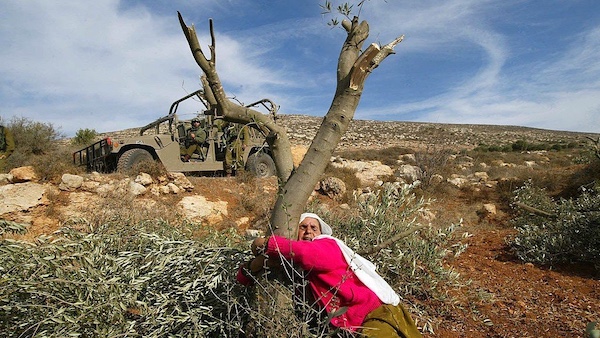The Israeli army has uprooted thousands of olive trees in the West Bank village of Al-Mughayyir in just the past three days, as part of a collective punishment campaign against Palestinian residents of the village, Israeli media reported on 24 August.
Olive farming is the backbone of Palestinian agriculture. Olive trees in the West Bank are often hundreds of years old, some even over a thousand years old, and are deeply tied to Palestinian identity, representing steadfastness and their historical connection to the land.
The Israeli army began uprooting the trees on Thursday, while also carrying out raids on homes and imposing a siege and curfew, preventing all movement into and out of the village located northeast of Ramallah.
After Israeli occupation forces ended the curfew and withdrew on Sunday, residents immediately began trying to replant the uprooted trees.
VIDEO | After three days of siege and raids, residents of Al-Mughayyir, northeast of Ramallah, replanted olive trees uprooted by Israeli occupation forces.
Thousands of trees have been destroyed across the area, as the village faces repeated attacks by the army and settlers. pic.twitter.com/X10WWzdgNt
— The Cradle (@TheCradleMedia) August 24, 2025
Marzouq Abu Naim of the Al-Mughayyir village council told Al-Araby Al-Jadeed on Saturday that during the three-day siege, Israeli forces had established military checkpoints to completely seal all entrances to the village, while forcibly closing businesses, including bakeries and pharmacies.
VIDEO | Destruction and devastation inflicted on Palestinian agricultural lands by Israel in the village of Al-Mughayyir northeast of Ramallah in the occupied West Bank, after three days of land leveling and tree uprooting. pic.twitter.com/V9NaQ60lxS
— The Cradle (@TheCradleMedia) August 24, 2025
Israeli forces also blocked them from leaving or entering the village, forcing pregnant women to walk through the checkpoints to neighboring villages for treatment.
Soldiers also raided homes, looting money, jewelry, and vehicles.
According to the Palestinian Prisoners Club, Israeli forces detained 14 residents, including the head of the village’s local council, Amin Abu Alia, and interrogated dozens more during the raids.
Additionally, the Colonization and Wall Resistance Commission reported that Israel targeted nearly 300 dunums of farmland, uprooting centuries-old trees, storming homes, and destroying property.
A Palestinian man was seen taking cover on the balcony of his house as Israeli forces raid al Mughayyir village, northeast of Ramallah.
Troops have stormed dozens of homes, vandalised property, assaulted residents, and arrested several young men since imposing a siege on the… pic.twitter.com/zv2wZ0JLEZ
— TRT World (@trtworld) August 22, 2025
On Thursday night, Maj. Gen. Avi Bluth, the head of the Israeli Army’s Central Command, stated that Al-Mughayyir would “pay a heavy price” for an alleged shooting attack against Jewish settlers from a nearby illegal outpost the previous day.
“Every village and every enemy needs to know that if they carry out an attack against the residents [settlers], they will pay a heavy price; they will experience a curfew, they will experience a closure, and they will experience ‘shaping operations,’” he said, in an apparent reference to uprooting the olive trees.
“We are now locking in on this village,” Bluth added, saying that the army’s efforts will deter “any village that tries to raise a hand against any of the residents [settlers],” Bluth added.
According to the Times of Israel, a 30-year-old Palestinian resident of Al-Mughayyir allegedly fired at settlers from the outpost,
without hitting any, before engaging in a physical altercation during which an Israeli man was lightly hurt.
He was later detained by a unit of Israeli reserve soldiers comprised of local Jewish settlers.
Al-Mughayyir has long been a target of settlers and soldiers alike amid plans for ethnic cleansing and further land grabs.
Since 1967, Israel has methodically stolen Palestinian land in the West Bank to build settlements for Jewish settlers immigrating from abroad as part of the Greater Israel colonial project.
Both peaceful and violent efforts of the indigenous Palestinian population to resist Jewish colonization of their lands have been met with harsh violence and military campaigns from the Israeli forces occupying the West Bank.

